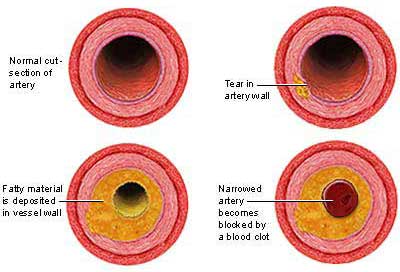Reversing Atherosclerosis Naturally
December 20, 2008 Written by JP [Font too small?]Smile! It’s Friday!
What if I told you there was a simple “anti-aging” activity that you could do in just a couple minutes a day that would a) make your arteries and your heart healthier and b) also make you more attractive? It sounds like a cheesy infomercial for a supercharged exotic fruit juice or an ancient facial serum from the far ends of the Earth, doesn’t it? Not quite.
I’ve discussed a substance called C-reative protein (CRP) before. It’s a protein that indicates a type of inflammation that may contribute to heart disease, stroke and, possibly, even some cancers.
 There are drugs and even supplements that can lower elevated CRP levels. But did you know that there’s something in your bathroom medicine cabinet that may be cheaper, more effective and could help give you a brighter smile and fresher breath?
There are drugs and even supplements that can lower elevated CRP levels. But did you know that there’s something in your bathroom medicine cabinet that may be cheaper, more effective and could help give you a brighter smile and fresher breath?
Flossing Your Arteries Clean
A group of scientists from England and Italy recently reported that irritated gums may be a significant source of chronic inflammation – as measured by elevated CRP levels.
The discovery was made by examining 35 middle-aged individuals who appeared to be healthy, with the exception of having mild to moderate gum disease. Several tests were administered to determine the level of oral bacteria, systemic inflammation (CRP) and the thickness of the blood vessels.
Prior to treatment there was a pattern of abnormally high inflammation established in the entire group. All the patients underwent periodontal treatment for a period of one year. During and after the treatment, blood tests and Echo-Doppler cardiography (an ultrasound procedure used to measure the thickness of the carotid artery) were employed. Here’s what the results showed:
- There was a reduction in the amount of harmful oral bacteria.
- A significant decrease in CRP levels was also found.
- The thickness of the arteries diminished after treatment.
Thickening of the arteries is a clear sign of atherosclerosis. Atherosclerosis is characterized by thickened, hardened arteries and is one of the leading contributors to heart attacks and strokes. Reversing that trend is truly astonishing.

How often do you floss? Do you brush at least twice-a-day? When’s the last time you visited your friendly, neighborhood dentist? Now remind me, how many hearts do you have? Two minutes a day and a few dollars a month may just be one of your best bets for improving your health and increasing your lifespan.
Be well!
JP
Referenced Material
Tags: Atherosclerosis
Posted in Alternative Therapies, Dental Health, Heart Health

December 21st, 2008 at 12:24 pm
Hi Paul,
I want to share that some HMOs do pay for the blood test for the C-Reactive protein marker. So if someone has partly neglected his/her teeth care and wonders about the risk involved, a choice is available: this person could have their Doctor prescribe this test, if justified.
Then a second test could be done after a good dental higiene visit followed by a period of conciencious daily flossing and teeth cleaning.
The period should match the frequency accepted by their HMO for this test, so no added cost is incurred.
This artiche could be a passport to persuade the Doctor!
This person may obtain proof to warrant adopting the new dental care habit permanently!
Paul
December 21st, 2008 at 4:33 pm
Excellent points, Paul!
I recommend that all my readers take your advice.
Be well!
JP
February 20th, 2015 at 2:24 pm
Update: Vitamin K2 (MK-7) improves arterial stiffness in older women …
http://www.ncbi.nlm.nih.gov/pubmed/25694037
Thromb Haemost. 2015 Feb 19;113(5).
Menaquinone-7 supplementation improves arterial stiffness in healthy postmenopausal women: double-blind randomised clinical trial.
Observational data suggest a link between menaquinone (MK, vitamin K2) intake and cardiovascular (CV) health. However, MK intervention trials with vascular endpoints are lacking. We investigated long-term effects of MK-7 (180 µg MenaQ7/day) supplementation on arterial stiffness in a double-blind, placebo-controlled trial. Healthy postmenopausal women (n=244) received either placebo (n=124) or MK-7 (n=120) for three years. Indices of local carotid stiffness (intima-media thickness IMT, Diameter end-diastole and Distension) were measured by echotracking. Regional aortic stiffness (carotid-femoral and carotid-radial Pulse Wave Velocity, cfPWV and crPWV, respectively) was measured using mechanotransducers. Circulating desphospho-uncarboxylated matrix Gla-protein (dp-ucMGP) as well as acute phase markers Interleukin-6 (IL-6), high-sensitive C-reactive protein (hsCRP), tumour necrosis factor-α (TNF-α) and markers for endothelial dysfunction Vascular Cell Adhesion Molecule (VCAM), E-selectin, and Advanced Glycation Endproducts (AGEs) were measured. At baseline dp-ucMGP was associated with IMT, Diameter, cfPWV and with the mean z-scores of acute phase markers (APMscore) and of markers for endothelial dysfunction (EDFscore). After three year MK-7 supplementation cfPWV and the Stiffness Index β significantly decreased in the total group, whereas distension, compliance, distensibility, Young’s Modulus, and the local carotid PWV (cPWV) improved in women having a baseline Stiffness Index β above the median of 10.8. MK-7 decreased dp-ucMGP by 50 % compared to placebo, but did not influence the markers for acute phase and endothelial dysfunction. In conclusion, long-term use of MK-7 supplements improves arterial stiffness in healthy postmenopausal women, especially in women having a high arterial stiffness.
Be well!
JP